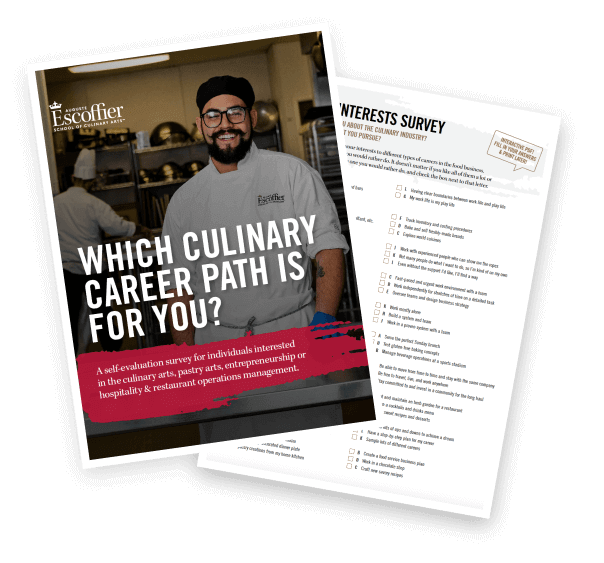You think you know where you want to work after you finish culinary school. You’ve read articles about what the field is really like, and you’re pretty sure it would suit you to a T. You might have your sights set on a specific type of food service establishment or working with a particular kind of cuisine.
But how can you be certain? If only there was a way to test out a job for a few weeks, get a bit of hands-on experience, and get a real feel for the day-to-day—before you seek out long-term employment.
Turns out, there is. It’s called an externship.
Find out exactly what an externship is, and answer the burning question: are externships paid?
What Is an Externship?
An externship—while it does have similarities to an internship—is not quite the same thing. It is both an educational and professional opportunity, broadening student horizons and putting the finishing touch on their formal culinary training.
A culinary externship is a short-term work opportunity that gives an aspiring cook or food professional a peek behind the curtain.
Unlike internships, which usually last three to four months and include a general range of tasks, externships are shorter and often intensive. They usually focus on a more specific niche, letting students practice skills learned in the classroom and gain experience with commercial kitchens and equipment.
Escoffier graduate Cortney Tenhet discusses her Disney externship*
At Auguste Escoffier School of Culinary Arts, every program requires students to complete either one or two hands-on industry externships as part of their curriculum. These opportunities help students to take the step between education and career, making connections and experiencing the realities of the industry first-hand.
Are Externships Paid?
Culinary school industry externships are often paid positions. In fact, most externships are paid and may lead to permanent employment in the industry. Many culinary school students have either full-time or part-time jobs while they complete their coursework—especially if they’re in one of our flexible online programs. For these students, their existing jobs may already qualify as externships. They can continue to earn their paychecks while they fulfill this requirement of the curriculum.
Boulder culinary arts graduate Douglas Rhoades worked as a steward on McMurdo Station in Antarctica for a season, doing dishes, janitorial work—whatever he was asked to do. His hard work convinced the chef to give him a shot as a cook the next year. During the off-season, he completed his program at Escoffier, then headed back onto the ice for his paid industry externship.
“Everyone in my Antarctica externship was so helpful and encouraging, it was great. The support and the people I got to work with was awesome. The experiences were incredible.”
Douglas Rhoades, Escoffier Graduate & Chef, Fire Mountain Residential Treatment Center
Other students secure a short-term job to serve as their externship, which may or may not be paid. Compensation is not a requirement for an externship to be approved by Escoffier. But as a student, you do have the option to seek a paid position. When the externship ends, the student and the employer may part ways. But some externships have led graduates to permanent job offers in the past, launching their careers in the industry.
Austin baking and pastry graduate Stacey Jones, for example, was hired full-time after completing her externship at Sway Thai in Austin, Texas. She rose through the ranks, becoming sous chef and eventually chef de cuisine at one of their popular locations. The right externship experience may help you accelerate your career in the industry.

Take the Culinary Career Survey
We’ve compiled a checklist of all of the essential questions into one handy tool: career options, culinary interest surveys, educational opportunities, and more.

What Can You Do for Your Externship?
The diversity of externship opportunities is vast. As long as an externship meets the specified criteria, a student can pursue it.
From food production to knife skills, there are a host of things to be practiced during an externship. A student studying plant-based culinary arts could possibly get an externship working in a vegan or vegetarian restaurant. A culinary arts student with an eye on BBQ could seek an externship with the local pitmaster or food truck. A student with a focus on farm-to-table cuisine could extern at a sustainable restaurant—or even at a local farm!
While you have the option to seek an externship near home, you can also take the opportunity to travel. Boulder graduate Parker Wilks-Bryant completed his externship at Pujol, currently ranked the 9th best restaurant in the world by The World’s 50 Best Restaurants.1 The fact that he lived in Colorado and the restaurant was in Mexico City didn’t slow him down! He saved his money so he could cover his living expenses while he pursued this amazing opportunity.**
Some students are still not sure exactly where they want to end up. For these folks, an externship is a great opportunity to “try on” a niche to see if it’s a good fit. An aspiring baker could seek a placement in a wedding cake bakery to determine whether that is the right environment for them. Or they could look for a spot in a patisserie, an artisan bread bakery, an Italian bakeshop, a fine dining restaurant, a retail bakery…

How to Find Your Escoffier Externship
While Escoffier’s Career Services is available to help, students are responsible for securing their own approved externships. Depending on their career goals, they may target specific skills like recipe development, plating and presentation, customer service, and many others during their externships.
In some cases, all a student has to do to get their foot in the door is ask. Kitchens are nearly always looking for passionate cooks to add to their teams. Parker Wilks-Bryant started the conversation with Pujol by sending a simple inquiry email—which he translated into Spanish with Google. Escoffier also partners with national and international businesses, connecting them with trained staff and externs. If there’s a particular business or a type of business that you have your eye on, just ask! You never know what connections the Career Services department has and what introductions they might be able to make.
As Patricia Souza, Escoffier VP of Career Services, says, “We start talking to you about your externship course really early in the process of becoming a student with us. We want to help you find what the right externship is for you based on your career goals and can help you to find those career goals early on, so you can understand what you want to do with your externship.”

Work, Learn, and Earn—All at Once
Is the hands-on industry externship an education opportunity, or a money making venture? Truth is, it can be both.
While externships don’t have to be paid, they certainly can be. And as a student, you have the option of seeking out paid opportunities.
The externship is a low-risk way to explore one small corner of the culinary world. If you find that it’s not a good fit, that’s wonderful! It means you’re one step closer to finding the right niche for you. And with your new culinary school credential in hand, you can be that much more prepared to reach out and grab the right opportunity.
An externship is the end of the culinary training at Escoffier. To get there, you’ll have to start at the beginning. Contact us to get the full details on all of our degree and diploma programs!
To learn more about culinary education, explore these articles:
- Should I Go to Culinary School? A Guide for Deciding
- Is Culinary School Necessary to Be a Chef?
- What Are the Types of Culinary Degrees and Diplomas?
*Information may not reflect every student’s experience. Results and outcomes may be based on several factors, such as geographical region or previous experience.
**Escoffier cannot assist with securing an international travel visa for hands-on industry externships.

 “Everyone in my Antarctica externship was so helpful and encouraging, it was great. The support and the people I got to work with was awesome. The experiences were incredible.”
“Everyone in my Antarctica externship was so helpful and encouraging, it was great. The support and the people I got to work with was awesome. The experiences were incredible.”

